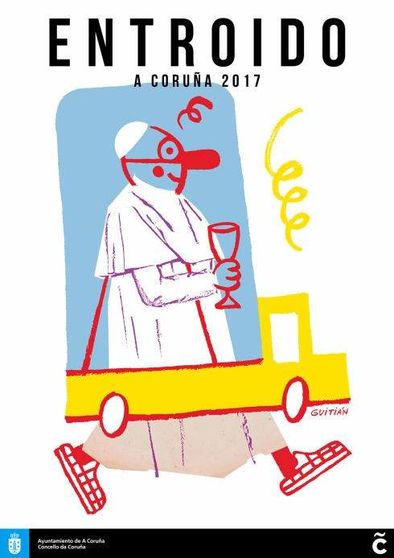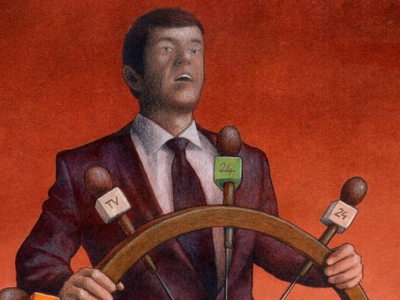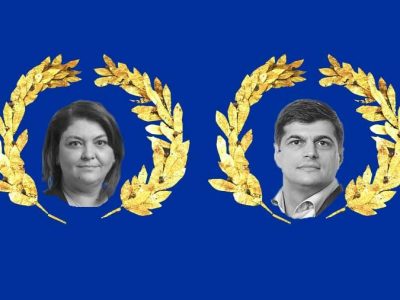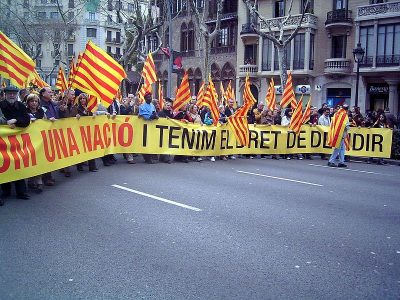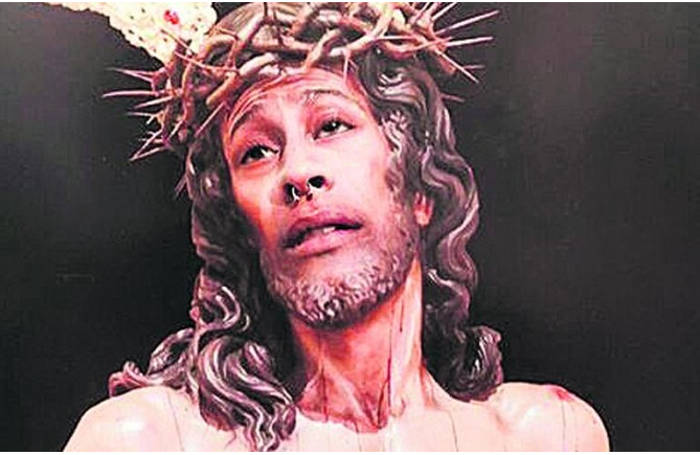
Image for which the youth from Jaén, Spain has to pay a fine, for “offending religious sentiments.” Photo published by laicismo.org and used with permission.
Daniel Serrano was ordered to pay a fine of 480 Euros for superimposing a photoshopped image of his face over that of Christ and circulating the resulting collage on the internet.
Almost a year ago, the 24-year-old shared the image on his Instagram account with the caption “Christ Disrobed.” The image of Christ came from a sculpture belonging to a group called the Hermanidad de la Amargura (brotherhood of bitterness) who use the sculpture during the Holy Week procession in the city of Jaén, Spain.
According to the town's daily newspaper, the brotherhood ordered Serrano to remove the photo from his account. He ignored the request, saying that he didn't consider the image offensive. The brotherhood decided to report the matter, and a local court agreed to hear the case
Prosecutors charged that Serrano had shown “a disregard towards and a mockery of the brotherhood,” adding that the photo was created with the “intention of offending the religious sentiments of its members.” They asked that Serrano pay a fine of 2160 Euros, or spend 180 days in prison if he was unable to pay.
Confronted with the possibility of jail, Serrano made a deal with the prosecution to plead guilty in return for a 480 Euro fine.
Serrano, who has a temporary job with an olive processing company, calculates that the fine constituted 10 days’ worth of pay.
The response from the Web
The judge's decision caused a wave of indignation and solidarity with Serrano online. Supporters created a crowd-funding support page and, in less than an hour, people had raised enough money to pay the fine.
Widespread exasperation at the decision caused a “Streisand effect”, contrary to what the brotherhood had been trying to achieve. Far from hiding the image, the case has now caused it to appear all over the internet.
Twitter was filled with memes of images of Christ and “Christ Disrobed” with a variety of different faces:
@amargura_jaen ya tenéis 480€ pero muy poca vergüenza.
El efecto Streisand en la cara de Cristo: la red se rebela ante la multa a un joven por su montaje https://t.co/uOdn9tBCQB #KallaLaBoca #OpFreeSpeech pic.twitter.com/TugdI2JiNt
— M. (@Ma_Madrid) 8 de febrero de 2018
@amargura_jaen You have 480 Euros and a little embarrassment.
The Streisand effect on the photoshopped face of Christ: the web is rebelling against the young Spaniard's fine over his image https://t.co/uOdn9tBCQB #KallaLaBoca #OpFreeSpeech pic.twitter.com/TugdI2JiNt
— M. (@Ma_Madrid) 8 de febrero de 2018
#CristoFace El cristo de la amargura ya no está amargao. Ahora se llama Yisus B Boy y tiene todo el flow! pic.twitter.com/U0QLPZD2x7
— Athman M. Charles (@AthmanMCharles) 10 de febrero de 2018
#CristoFace the image of the embittered Christ isn't so embittered anymore. Now his name is Yisus B Boy and he's got moves!
— Athman M. Charles (@AthmanMCharles) 10 de febrero de 2018
One Twitter user, Carlos Vidal Ojea, has even created a web page where anyone can easily photoshop their face onto the image in question.
Joaquín Urias, ex-magistrate of the Constitutional Court of Spain, also joined forces with internet users reproducing the photo, to make clear his position on the right to freedom of expression:
Bueno, pues como lo de condenar a un chaval por hacer un montaje de su cara con un Cristo me parece una barbaridad…me solidarizo. Un saludo a la fiscalía!! pic.twitter.com/JB2sFUpizj
— Joaquín Urias (@jpurias) 7 de febrero de 2018
Well, punishing a guy for photoshopping his face onto an image of Christ seems barbaric to me. I stand beside you. A big hello to the prosecutor's office! pic.twitter.com/JB2sFUpizj
— Joaquín Urias (@jpurias) 7 de febrero de 2018
Everything under the microscope
This is just the latest example of the attacks on freedom of expression in Spain in recent years. Due to a series of legal reforms passed in 2015, Article 525 of the Spanish Penal Code now imposes a sentence of eight to twelve months for:
“…offending the religious sentiments of members of a religious group, by public speaking, or by writing or through any kind of documents which have derisive remarks, about their dogmas, beliefs, rituals or ceremonies, or harass, also publicly, those who believe or practice.”
The vagueness of the law means that measuring the severity of the offence is a completely subjective process that depends of the judge's interpretation of the matter, which could vary substantially.
In an opinion piece for ElDiario.es (the Spanish newspaper), criminal law professor Isabel Elbal explained that all of these supposed “crimes” were already punishable by the civil court, although they carried a lesser punishment.
Furthermore, while civil action can only be taken by people directly affected by the speech, the penal channel is open to any accuser. This combined with the previously mentioned lack of clarity in the law has lead to a wave of people and organisations representing extreme political or religious groups bringing (mostly outlandish) complaints.
Such is the case of the lawsuit against Dani Mateo and Gran Wyoming, who were accused by the Asociación para la defensa del Valle de los Caídos – a monumental memorial constructed after the Spanish Civil War and home to the tomb of Spanish dictator Franco – of making fun of the enormous cross that sits at the top of the site. The case was later thrown out.
The Spanish Association of Christian Lawyers also has brought some high-profile cases. A year ago it brought to trial the case of the artist Drag Sethlas, for the show which won him the Gala Drag Queen award at the Carnival of Las Palmas, Gran Canaria, in 2017. The lawsuit was later thrown out by a judge.
Another case was brought against a group of people who carried a huge vagina through the streets of Seville, in what they called the procession of the “Blessed Rebellious Vagina,” a parody of the usual Holy Week parade featuring the Virgin Mary. They were not so lucky, and saw the case against them reopened after the Christian Lawyers fought an appeal against the dismissal of their case.
One of the most bizarre cases of late came with a complaint filed by the president of the Widow's Association of the city Lugo, northwest Spain, against the City Counselor of Culture for the nearby city of La Coruña for using posters to advertise the city's carnival celebration, which depicted a puppet dressed up as the Pope. That case was also thrown out.
Although the majority of these cases did not result in criminal charges being brought, there are many others which ended with sanctions filed against the defendants. There is also the stress and expense by such cases, in which people are brought to court primarily for exercising their rights to freedom of expression, which is theoretically protected by the Spanish Constitution.
Joaquín Urías, professor of Constitutional Law, in his article ¡Menudo Cristo! ¿Qué hacemos con el delito de blasfemia? (That's Some Jesus! What do we do with the crime of Blasphemy?), believes that Spanish jurisprudence continues to be strongly linked to the principles and values of the Franco era:
La sobrevaloración del fenómeno religioso -especialmente católico- permite que todavía se utilice a menudo un parámetro religioso para decidir los límites de la libertad de expresión.
El derecho penal puede perseguir las ofensas contra quienes practican una religión. Pero no corresponde a los practicantes definir qué es lo ofensivo.
Over-valuing religious phenomena — especially when they're Catholic — means that religious parametres are still sometimes used to decide the limits of freedom of expression. Criminal law can be used to prosecute offenses against people who practice a religion. However, it is not their job to define what an offence is.


